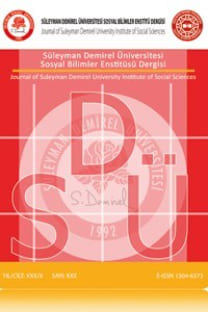THE PSYCHICAL FRAGMENTATION IN THE PERSPECTIVES OF SIGMUND FREUD AND JACQUES LACAN
This paper examines the major causes and symptoms of psychical fragmentation in the perspectives of Sigmund Freud and Jacques Lacan. These perspectives are pertinent to explore libidinal desire, the psyche and repression, and the unconscious as the essence of selfhood. The basic structures of civilization which entail rules and codes stand as deterrents and restraints that lead to psychical division and introversion as continual danger. The split between libidinal demand and satisfaction forms psychological gaps and void, entangling the subject into unconscious struggle for well-being. The subject’s sufferings from psycho-sexual repression, schizophrenia, neurosis, delirium and paranoia are implemented in fragmented discourses which imply repressed feelings, unfulfilled desires and unrealized dreams. These form the fragmented subjectivity. Henceforth, the subject resorts therapeutic strategies, seeking gratification and redemption
Anahtar Kelimeler:
fragmentation; psychoanalysis, psyche, libido
THE PSYCHICAL FRAGMENTATION IN THE PERSPECTIVES OF SIGMUND FREUD AND JACQUES LACAN
This paper examines the major causes and symptoms of psychical fragmentation in the perspectives of Sigmund Freud and Jacques Lacan. These perspectives are pertinent to explore libidinal desire, the psyche and repression, and the unconscious as the essence of selfhood. The basic structures of civilization which entail rules and codes stand as deterrents and restraints that lead to psychical division and introversion as continual danger. The split between libidinal demand and satisfaction forms psychological gaps and void, entangling the subject into unconscious struggle for well-being. The subject’s sufferings from psycho-sexual repression, schizophrenia, neurosis, delirium and paranoia are implemented in fragmented discourses which imply repressed feelings, unfulfilled desires and unrealized dreams. These form the fragmented subjectivity. Henceforth, the subject resorts therapeutic strategies, seeking gratification and redemption.
Keywords:
fragmentation, psychoanalysis, psyche, libido, desire, (un)conscious, discourse, repression, schizophrenia neurosis, paranoia, gratification,
___
- Bertens, Hans. Literary Theory: The Basics. New York: Routledge, 2008.
- Deleuze, Gilles, and Felix Guattari. Anti-Oedipus: Capitalism and Schizophrenia. Minneapolis: University of Minnesota Press, 1996.
- Dews, Peter. Logics of Disintegration: Post-Structuralist Thought and the Claims of Critical Theory. London: Cambridge Press, 1987. Ellmann, Maud, ed. Psychoanalytic Literary Criticism. New York: Longman Group, 1994.
- Psychoanalytic Literary Criticism, ed. Ellmann. New York: Longman Group, 1994. 76-102.
- Freud, Sigmund. Totem and Taboo in The Basic Writings of Sigmund Freud. Ed. and Trans. A. Bill. New York: Random House & INC., 1938. 807-930.
- ---. Civilization and its Discontents, ed. and Trans. James Strache. New York: W.W. Norton & Company, Inc, 1961. ---. The Interpretations of Dreams. Trans. Joyce Crick. New York: Oxford University Press, 1999.
- ---.On Metapsychology. Trans. Angela Richards. London: Penguin Books Ltd, 1984.
- ---.Sexuality and the Psychology of Love. New York: Mamillan Publishing Company, 1963.
- Klages, Mary. Literary Theory: A Guide for the Perplexed. London: Continuum International Publishing Group, 2006.
- Labsley, Rob. "Psychoanlytic Criticism", The Routledge Companion to Critical Theory. Ed. Simon Malpas and Paul Wake. London: Routledge, 2006. 66-80.
- Lacan, Jacques. Ecrits. Trans. Alan Sheridan. London: Routledge, 1977.
- ---. The Four Fundamental Concepts of Psycho-Analysis. N.P.: Penguin Group, 1977.
- Maurice, Charney. Sexual Fiction. London: Metheun, 1981.
- Meyer, Michael. The Compact Bedford Introduction to Literature: Reading, Thinking, Writing. Bedford/St. Martin's, 2000.
- Ward, Glenn. Postmodernism. Chicago: Mc Graw-Hill Companies, 2003.
- Yayın Aralığı: Yılda 3 Sayı
- Başlangıç: 2005
- Yayıncı: Süleyman Demirel Üniversitesi
Sayıdaki Diğer Makaleler
HOLLYWOOD'UN YUMUŞAK GÜÇ ARACI OLARAK ABD TARAFINDAN KULLANIMI: SOĞUK SAVAŞ DÖNEMİNE BAKIŞ
TÜRKİYE’DE ENTEGRE RAPORLAMA GÖSTERGELERİNDE İŞLETMELER ARASI FARKLILIKLAR
Mahmut ÇELEBİER, Fikret ÇANKAYA, Aykut KARAKAYA
SURİYE’NİN JEOPOLİTİK KONUMU BAĞLAMINDA SURİYE-RUSYA İLİŞKİLERİ
Pınar Göktaş, Burcu Değirmenci
Lise Öğrencilerinin Okula Bağlılık İle Genel Öz-yeterlilik Düzeyleri Arasındaki İlişki
ÇEVRESEL KUZNETS HİPOTEZİ: TÜRKİYE ÜZERİNE AMPİRİK BİR UYGULAMA
SÖMÜRGE ÖNCESİ DÖNEMDEN GÜNÜMÜZE AFRİKA’DA KENTLER VE KENTLEŞME HAREKETLERİ
TEFSÎR VE HADÎS KAYNAKLARINDA ÂYETLERİN İSM-İ TAFDÎL İFADELERİYLE TAVSÎFİ HAKKINDA BİR İNCELEME
THE PSYCHICAL FRAGMENTATION IN THE PERSPECTIVES OF SIGMUND FREUD AND JACQUES LACAN
